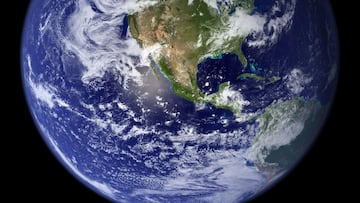How climate change has already affected Earth’s rotation and length of its days
According to a new study, effects caused by global warming are having a greater impact on the speed of Earth’s rotation than that of the Moon.

A group of researchers has revealed that climate change, although minimally, affects the lengthening of the day and the alteration of Earth’s rotation axis. And the reason is clear: the loss of ice masses in Greenland and Antarctica.
The research can be consulted in the journal 'Proceedings of the National Academy of Sciences' (PNAS).
Experts, including some from NASA’s Jet Propulsion Laboratory (JPL) and the Swiss Federal Institute of Technology (ETH) in Zurich, have pointed out that water from polar regions flows into the oceans, especially towards the equatorial zone. This causes a mass displacement that affects the planet’s rotation.
Climate change vs the Moon on Earth’s rotation
“It’s like when a figure skater spins,” explained Benedikt Soja from ETH. “First keeping their arms close to their body, and then extending them. The initially rapid rotation slows down. The masses move away from the axis of rotation, increasing physical inertia,”
In physics, this is referred to as the law of conservation of angular momentum, which governs Earth’s rotation. If it slows down, the days become longer. Therefore, “climate change is also altering the length of the day on Earth, albeit only minimally.”
It's not just in your head: A new study shows that days are getting longer – and the change is accelerating.
— NASA JPL (@NASAJPL) July 19, 2024
In recent decades, faster melting of ice sheets has shifted mass from the poles toward the equatorial ocean, causing Earth's rotation to slow. https://t.co/s3yRvPT1hK pic.twitter.com/7cbzuToieM
Related stories
Over millennia, the length of the day has gradually increased by a few milliseconds per century (ms/cy), largely due to the gravitational pull of the Moon, which slows Earth’s rotation. Currently, climate change is increasing the length of the day by a few milliseconds relative to the current 86,400 seconds. “Humans have a greater impact on our planet than we realize,” noted Soja. Naturally, this “places a great responsibility on us for the future of our planet.”
Another study, published in Nature Geoscience, shows that the mass changes on Earth’s surface and interior caused by ice melt also alter the axis of rotation. However, “there is no need for concern, as these effects are minor and unlikely to pose a risk.” That said, although Earth’s rotation changes minuscule in human life terms, the effect must be considered when navigating space.


Complete your personal details to comment